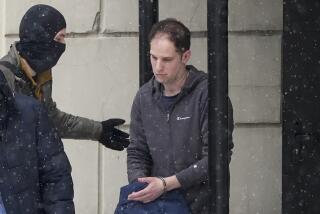Former Russian spymaster convicted of treason
A Russian military court sentenced a former spymaster to 25 years in prison Monday for betraying an espionage ring operating in the United States, a revelation last year that briefly strained relations between the two nations and turned one of the spies into a celebrity at home and abroad.
Col. Alexander Poteyev was found guilty of high treason and desertion by the Moscow Military District Court, which also stripped him of his rank and awards and fined him the amount of his annual salary.
Poteyev was convicted in absentia; he fled Russia last June shortly before the spy ring was exposed.
According to the verdict, Poteyev exposed to the CIA the names, financial arrangements and communications channels of 11 Russian agents working in the United States. He had been deputy head of the 5th Department of the Foreign Intelligence Service Directorate S in charge of undercover operations.
Ten of the spies were arrested in the United States last June. The 11th, alleged ringleader Christopher Robert Metsos, fled to Cyprus. He was briefly detained there at the request of the U.S. government, but was released on bail the same day and disappeared.
In a bid to move beyond the awkward scandal, the U.S. in July exchanged the rest of the spies for four Russian prisoners convicted of spying for the West. Those released by Russia included scientist Igor Sutyagin, whom the international human rights community considered a prisoner of conscience, and former Foreign Intelligence Service Col. Alexander Zaporozhsky, who allegedly helped expose CIA mole Aldrich Ames. Sutyagin now lives in Britain and Zaporozhsky in the United States.
Among the spies the U.S. released was Anna Chapman, 29. She and her follow agents were feted by Russian President Dmitry Medvedev and praised by Prime Minister Vladimir Putin, who said that “an interesting and bright life is in store for them.”
Putin’s words were prophetic for Chapman. While the rest of the ring kept out of the public eye, she was seen at a space launch in Kazakhstan, appeared on the cover of a glossy publication in scanty underwear, became one of the leaders of a pro-Kremlin youth movement and earlier this year landed a TV anchor job.
According to the verdict issued Monday, Poteyev fled Russia in a hurry, leaving in the middle of a meeting at his agency. He traveled by train to Belarus on a false passport, then to Ukraine, where he met with a CIA agent who put him on a plane to the United States via Frankfurt, Germany, the verdict said. His whereabouts are unknown.
His wife, son and daughter had previously left Russia.
Judge Alexander Ababkov read a text message sent by Poteyev to his wife as he was fleeing: “Mary, try to take it calmly. I am leaving not for some time but forever. I didn’t want to but I have to. I will start a new life and will try to help the children.”
Poteyev didn’t have close friends in the agency, one Russian Foreign Intelligence Service officer said.
“Such a painstaking operation, years of work, so much money and effort, all went down the drain,” said the officer, who spoke on condition of anonymity because of the sensitive nature of the case. “Now the atmosphere at work is very bad and tense, as so many people think they are under suspicion and no one is trusted anymore, all because of this scoundrel.”
The officer complained of low salaries in the agency and cited that as the most likely reason for the betrayal.
The number of Russian defectors has been growing since the breakup of the Soviet Union, said former Russian spy and now author Mikhail Lyubimov.
“In our time, many people in our trade were guided by ideology and the feeling of patriotism although our salaries were lower than that of a U.S. Embassy night watchman,” said Lyubimov, who worked as a spy in the West in the 1960s and ‘70s. “But I am inclined to think that the damage from this particular betrayal is still pretty questionable, given the professional quality of the betrayed agents like Anna Chapman, for instance.”
More to Read
Start your day right
Sign up for Essential California for news, features and recommendations from the L.A. Times and beyond in your inbox six days a week.
You may occasionally receive promotional content from the Los Angeles Times.





